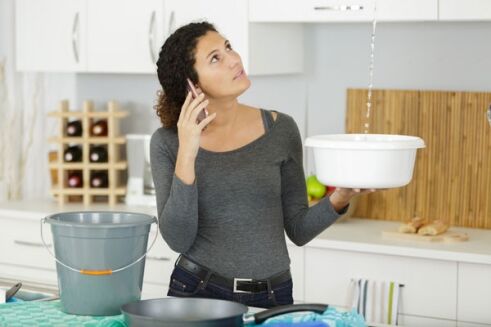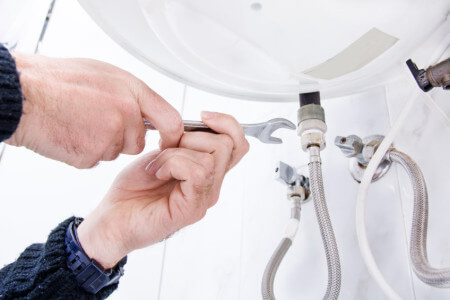Immediate Solutions for Emergencies: What to Do Until Help Arrives
Immediate Solutions for Emergencies: What to Do Until Help Arrives
Blog Article
Everybody may have their personal conception on the subject of Expert Tips for Managing a Plumbing Emergency Until Help Arrives.

Pipes emergencies can strike at any moment, triggering stress and potential damages to your home. Whether it's a ruptured pipeline, a blocked drain, or a dripping tap, knowing how to handle the circumstance till a professional plumbing arrives can save you from additional difficulties. This write-up gives crucial emergency situation plumbing suggestions to assist you reduce damage and restore control during a plumbing crisis.
Switch off the Water
The very first step in any type of plumbing emergency is to shut off the water supply. For local concerns, such as a dripping faucet or bathroom, turn off the valve near the component. When it comes to a major leak or burst pipe, situate your home's major water shut-off shutoff and turn it off instantly. Knowing the area of these valves beforehand can conserve beneficial time throughout an emergency.
Shut Off Your Hot Water Heater
In specific emergencies, such as a ruptured pipeline, it's a good idea to shut off your hot water heater. This stops overheating or damages to the system when water stops flowing. Switch off the power supply to the water heater (electrical or gas) and allow it cool down to stay clear of prospective risks.
Momentarily Quit a Burst Pipeline
A burst pipeline can cause significant water damages in minutes. To mitigate the problem:
Call an expert plumber promptly to address the issue permanently.
Have an Emergency Situation Pipes Set
Prepare a standard plumbing emergency situation kit to manage minor problems properly. Your kit needs to include:
Having these tools on hand can make a considerable distinction in your ability to handle emergency situations.
Unclog Drains Securely.
A clogged up drain can be a discouraging and unpleasant issue. Right here's exactly how to tackle it:.
If these methods don't function, avoid using extreme pressure, as it may intensify the clog.
Take Care Of Overflowing Toilets.
An overflowing bathroom can trigger prompt chaos. Right here's what you must do:.
Address Little Leaks with Temporary Fixes.
Tiny leakages can swiftly end up being considerable problems if left unchecked. Make use of these short-lived repairs up until professional aid gets here:.
While these fixes aren't irreversible, they can assist minimize water loss and damages.
Deal With Frozen Pipes Meticulously.
In chillier climates, icy pipes are a common emergency situation. If you think an icy pipe:.
Know When to Call a Specialist.
While quick fixes can help momentarily, certain pipes issues need prompt expert focus. Call a plumbing technician if:.
Without delay contacting a professional guarantees the problem is settled correctly and prevents additional issues.
Avoid Additional Damages.
Taking fast action to reduce damages can conserve you time and money over time. Below's just how:.
Conclusion.
Plumbing emergencies can be frustrating, however with the best understanding and tools, you can handle the situation effectively until help gets here. By switching off the water, resolving little leaks, and using temporary solutions, you can lessen damages and keep your home safe. Remember, these tips are short-lived options; always speak with a licensed plumber to manage the source of the problem. Prep work and fast thinking are your best allies in any type of plumbing emergency situation.
8 Helpful Tips for Managing Plumbing Emergencies at Home
If your plumbing system hasn’t failed once, wait for it because almost everyone has a story to tell. Sometimes, it could be simple emergencies such as a leaking pipe, a blocked cistern, or even a big burst pipe. In situations like this, you need to have some handy tips to save you some money and from possible damages.
Take care of minor issues early.
Sometimes, you could have avoided an emergency by taking proactive measures while it was still early. Some major plumbing emergencies can be a result of an ignored minor issue. We recommend that you have items like plumbing tapes and other related items. A plumbing tape can allow you to manage minor leaks before the plumber arrives.
Cut off the water supply.
This tip is essential in almost any type of leakage problem. For problems like minor leakages in the toilet or kitchen, turn off the supply that takes water to the affected pipes. If the leakage is a major pipe, you must shut off the supply valve to the entire building. This will help you avoid flooding your home and neighbors if you share a flat.
Know your plumbing system
Folks typically move into a new apartment without understanding the water supply around the building. This can prove disastrous if a water emergency arises and the plumber is far away. The previous tip will prove useless if you don’t practice this one. More importantly, know where your water shut-off valve is located – you’ll need that knowledge to prevent potential home floods.
Have some common handy tools
There are lots of plumbing emergencies that you can handle without hiring a plumber. That’s why you must keep some tools available always. Some tools that you can use to fix simple plumbing emergencies easily include plumbing tapes, screwdrivers, thread seal tapes, plungers, pliers, tape measures, and rubber gloves.
Insulate your pipes from cold
You’ll save yourself from many plumbing expenses if you protect your water pipes from the cold. This is because of the harmful effects that cold weather can have on your pipes. During winter, your pipes can burst from being overly expected to freezing temperatures. So, make sure insulators are there to keep the pipes working correctly.
Avoid practices that will clog your toilet.
Many people indulge in practices that can damage the plumbing system of the entire building. One of these is when they use their toilet to dispose-off garbage. They flush all kinds of things, such as paper towels, bandages, hairs, female sanitary products, etc., down the toilet. This will block your toilet in the long run, incurring unnecessary expenditures. Dump such waste in the trash instead.
Check your dials regularly.
Sometimes, there could be leakages in your home without noticing them in time. So, constantly monitor your water meter dial. If the dial is reading when there is nobody using water, this is an indicator that there is leaking. Check for leaks immediately. Call a plumber as soon as possible if you can’t find any.
https://www.constructionplacements.com/8-helpful-tips-for-managing-plumbing-emergencies-at-home/

Hopefully you enjoyed reading our part about Plumbing Emergencies: Tips on What To Do Before. Thank you for spending some time to browse our article post. If you please take a moment to distribute this write-up if you enjoyed reading it. We recognize the value of your readership.
Click Here Report this page